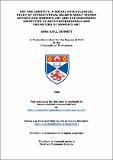Files in this item
Art and identity : a social psychological study of stereotypical beliefs about women artists and women’s art and the discursive identities of arts professionals and promoters of women’s art
Item metadata
| dc.contributor.advisor | Prescott, Robert | |
| dc.contributor.author | Dunnett, Anne S.W.L. | |
| dc.coverage.spatial | 240 | en_US |
| dc.date.accessioned | 2015-04-08T12:28:54Z | |
| dc.date.available | 2015-04-08T12:28:54Z | |
| dc.date.issued | 1998-10 | |
| dc.identifier | uk.bl.ethos.587551 | |
| dc.identifier.uri | https://hdl.handle.net/10023/6447 | |
| dc.description.abstract | The thesis is a social psychological study of beliefs about women artists and women's art. It is argued that the work of women artists is systematically undervalued in society and it is also argued that people's beliefs about women artists, and their attitudes towards women's art, are stereotypical. People are shown to have stereotyped beliefs about women artists and it is argued that stereotypes comprise the cognitive component of people's attitudes towards women's art. An argument is then presented that the origins of stereotypes can be found in social identity and personal identity. The conclusion is drawn that people's social identities and personal identities influence their views on women artists and their attitudes towards women's art, as represented by the stereotypical belief component of those attitudes. The results of an analytic survey are then presented in support of this claim. The survey findings show that two social identity factors, feminism and gender, and one personal identity factor, sex-role categorisation, influence people's beliefs about women artists and women's art. Having established that people's views on women artists and their work are stereotypical, the thesis then moves on to consider what effect this has on the sense of self of a group of arts professionals. An argument is presented that, in order to accomplish this task, it is necessary to replace survey methodology with discourse analysis techniques. Analyses are then presented of a set of interviews with arts professionals and those involved in promoting women's art. The results of these analyses show that the subjects are able to employ discursive accounts in order to preserve a positive sense of identity in the face of possible challenges to their sense of self In the final chapter, some concluding comments are offered on the advantages associated with adopting a mixed-methodology approach of this kind. | en_US |
| dc.language.iso | en | en_US |
| dc.publisher | University of St Andrews | |
| dc.rights | Creative Commons Attribution-NonCommercial-NoDerivatives 4.0 International | |
| dc.rights.uri | http://creativecommons.org/licenses/by-nc-nd/4.0/ | |
| dc.subject.lcc | N8354.D9 | |
| dc.title | Art and identity : a social psychological study of stereotypical beliefs about women artists and women’s art and the discursive identities of arts professionals and promoters of women’s art | en_US |
| dc.type | Thesis | en_US |
| dc.type.qualificationlevel | Doctoral | en_US |
| dc.type.qualificationname | PhD Doctor of Philosophy | en_US |
| dc.publisher.institution | The University of St Andrews | en_US |
This item appears in the following Collection(s)
Except where otherwise noted within the work, this item's licence for re-use is described as Creative Commons Attribution-NonCommercial-NoDerivatives 4.0 International
Items in the St Andrews Research Repository are protected by copyright, with all rights reserved, unless otherwise indicated.


